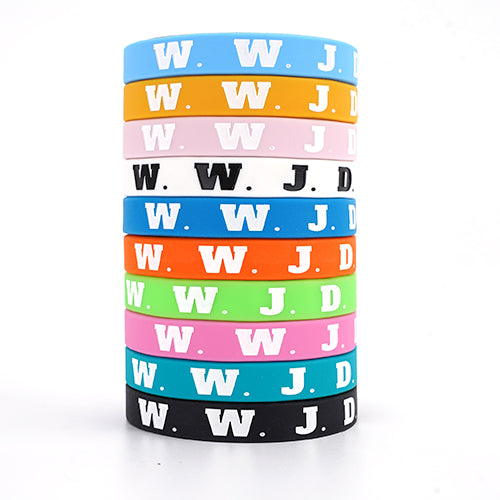Wearing silicone wristbands has become a popular trend around the world. From charity events to various festivals, wristbands appear frequently on these occasions. Although people love silicone wristbands very much and serve as a fashionable accessory, the impact of silicone wristbands on the natural environment also deserves our attention. Next, we discuss how these beloved wristbands are produced, used and disposed of, as well as the impact of these silicone wristbands on the earth's environment.
What are the main ingredients of silicone wristbands?
The main component of silica gel is silica sand, which is a abundant natural resource. Humans have processed this raw material into the ingredients needed to make silica gel. Compared with plastic, silica gel is more environmentally sustainable because silica gel is extracted from petroleum and has a relatively weak impact on the natural environment. The silicone wristband is a relatively durable item, which also means that it is not a one-time use, but can be used for a long time, which reduces the waste of resources from the source.
How are silicone wristbands made?
There are multiple processes involved in manufacturing a silicone wristband, including mixing, forming and solidifying the silicone material. There are advancements in manufacturing today that can make the manufacturing process more environmentally friendly by reducing harmful emissions and increasing energy efficiency. Manufacturers' environmental awareness is gradually increasing, which is reducing the pollution generated by the wristband production process.
Durability and wear
Long-lasting durability is one of the advantages of silicone wristbands. Since the silicone wristband can be used for a long time, people can reduce the frequency of replacement, thereby reducing the waste of resources caused by frequent replacement, which also means that the raw materials consumed in each wristband can be fully used.
Reuse
Although silicone wristbands have many advantages, they also present certain difficulties in reuse. Because silicone wristbands are difficult to degrade naturally, they are generally not accepted in recycling bins. What is gratifying is that there are now some new recycling methods that have begun to solve this problem. They recycle discarded wristbands and use them in new silicone products. This measure greatly improves the efficiency of resource utilization and reduces waste. generated garbage.
At last
Silicone wristbands are not without their problems, but there are encouraging results in production and recycling. As consumers, we need to encourage and support manufacturers and companies that adopt these environmentally friendly practices and actively participate in old wristband recycling programs. Let us continue our efforts to promote the spread of environmental awareness in all aspects of daily life.
Exemple de devis de bloc
Le vestibule Praesent congue tellus à fringilla. Curabitur vitae semper sem, eu convallis est. Cras felis nunc commodo eu convallis vitae interdum non nisl. Mécène ac est sit amet augue pharetra convallis nec danos dui.
Exemple de galerie de lookbooks

Exemple de texte de paragraphe
Cras soupçonne quam et turpis eleifend vitae malesuada magna congue. Damus id ullamcorper neque. Sed vitae milieu d'un cosmo pretium aliquet an sedo delitos. Pellentesque nulla eros accumsan quis justo at tincidunt lobortis denimes loremous. Suspendisse vestibulum lectus in lectus volutpat, ut dapibus purus pulvinar. Le vestibule est assis amet auctor ipsum. Proin molestie egestas orci ac suscipit risus posuere loremous.





















